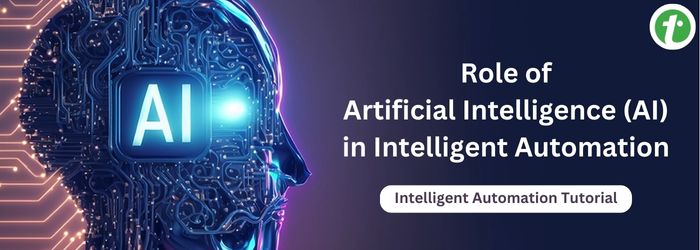
Role of AI in Intelligent Automation
Artificial Intelligence (AI) is the fundamental building block of Intelligent Automation; it helps handle complex tasks with cognitive decision-making. In this chapter, we will highlight the Role of AI in Intelligence Automation.

Basically, AI is the heart of intelligent automation, as it makes systems capable to self-learn, adapt to change, and make more informed decisions. Lets move ahead and learn how AI is so important in intelligent automation.
Role of AI in Intelligent Automation
The main function of artificial intelligence (AI) in intelligent automation is to provide cognitive capabilities to handle complex data and tasks, make data-driven decisions, and adapt to changes without any external upgradation. However, AI performs many more important functions in IA to make the automation intelligent.
Some of the key functions of AI in IA are explained below −
- Decision Making − Artificial intelligence allows automation systems to analyze process data, identify relations and patterns in them, and make more informed decision based on this data.
- Handling Unstructured Data − Artificial intelligence also provides abilities to automation systems to handle unstructured data in various formats like text, image, videos, audios, etc. For this purpose, it integrates various sub-domains of AI like natural language processing, computer vision, etc.
- Self-Learning − AI also makes use of machine learning in automation systems to allow them self-learning and improve from past experiences. It enables automation systems to adapt to changes in processes and workflows over time, and enhances accuracy and efficiency of automation systems.
- Process Optimization − Artificial intelligence can accurately analyze huge amounts of process data to identify issues and inefficiency. Hence, AI provides recommendations for process optimization, and allows to make the workflows efficient as much as possible.
- Identifying Possible Areas for Automation − Artificial intelligence continuously monitors the business operations within an organization and provides insights about possible areas of automation.
These are the key functions that AI performs as a part of intelligent automation to make the automation smarter and more efficient.
Key AI Technologies Used in Intelligent Automation
In intelligent automation, various artificial intelligence technologies are used to implement and perform different functionalities. Some of the key AI technology widely employed in intelligent automation are explained here with their core functionality −
- Data Analysis − It is one of the basic AI technologies used in intelligent automation. It provides capabilities to analyze large amounts of process data to identify bottlenecks, inefficiencies, patterns, etc. This AI technology provides valuable insights to make informed decisions and optimize processes.
- Machine Learning − ML is an advanced AI technology that enables automation systems to learn from data and past experiences and improve over time without need for programming externally. This technology enhances the accuracy and efficiency of intelligent automation.
- Natural Language Processing (NLP) − NLP is another modern AI technology used in intelligent automation, and it enables systems to understand and process human languages required for automating tasks and processes.
- Computer Vision − It is an AI technology that provides capabilities to understand and analyze visual data from images or videos and use it for automating processes.
Benefits of AI in Intelligent Automation
AI allows Intelligent Automation to identify inefficiencies and optimize processes and workflows. By providing advanced capabilities like self-learning, adapt to changes, and self-improvement over time, AI offers the following key benefits in intelligent automation −
- AI provides capabilities to automate complex, time-consuming processes, and hence improves operation efficiency of intelligent automation.
- AI enhances the accuracy of intelligent automation by minimizing human errors and dynamic learning.
- AI allows organizations to scale their automation functionalities without making significant changes to meet the growing demands of business.
- AI provides big data analytics capabilities and actionable insights for enhanced decision-making.
Conclusion
Intelligent Automation is an advanced automation technology which simulates intelligence (i.e., artificial intelligence) in business process automation. AI provides cognitive capabilities in process automation to enhance efficiency, productivity and accuracy. It allows automation systems to handle more complex processes and operations.
Let's move to the next chapter in the tutorial and learn about Major Applications of Intelligent Automation in Real-World Industries.